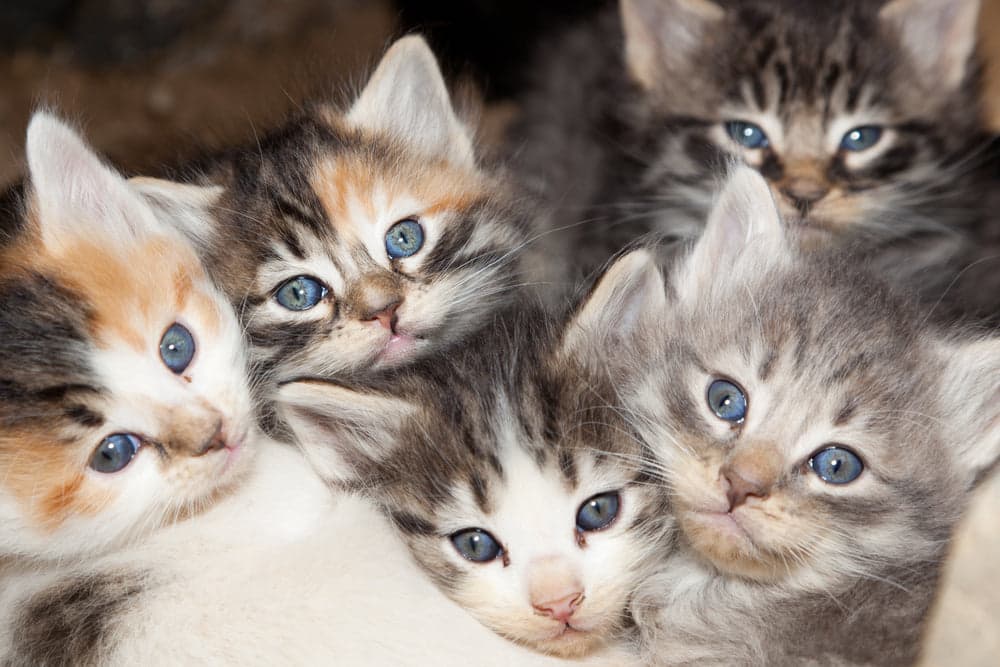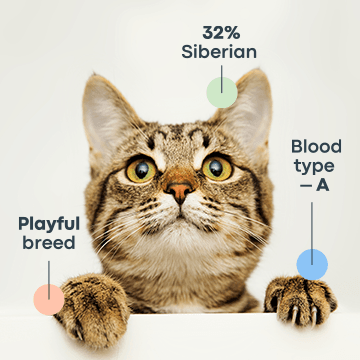During the early weeks of kittenhood, cat siblings form strong bonds and become prized companions to one another. However, the relationships between cat siblings can be quite puzzling. Read on to learn everything you need to know about cat siblings!
Keeping Siblings Together During Kittenhood
While a kitten's early interactions with mom are essential for healthy mental, physical, and emotional development, littermates serve an equally important role. Though it has been thought that kittens can be separated from their mother and littermates as soon as they are weaned and start eating on their own (typically between 5 to 7 weeks of age), it is generally recommended that they are kept with their littermates for at least 12 weeks.

"The smallest feline is a masterpiece." ― Leonardo da Vinci
The first 7 weeks of kittenhood represent an important socialization period_,_ during which early interaction and grooming behavior between littermates begins. The period between the 7th and 14th week is actually the most active play period between kittens, when many physical coordination and socialization skills, including the ranking process of who's in charge, are learned.
Kittens observe their mom and siblings and start playing with objects and animals around them. Interactions include chasing each other, pouncing, ambushing, leaping, hugging, and grooming. Scooping, tossing, pawing, and holding objects are all skills that littermates learn from one another. These weeks are a crucial learning period, during which kittens are learning how to be a cat.
Brain development in kittens is correlated with regular daily handling during the first 7 weeks of life. They tend to be more playful and curious and are more likely to develop larger brains. The more active kittens in the litter can be beneficial to their more timid and shy siblings, helping them feel safe and secure as they learn to play and explore together.
Kittens who are separated from their mother and littermates too early often fail to develop regular social skills. For example, as kittens play together, they learn important lessons about the strength of a bit and how hard is too hard when biting. Separated kittens are more likely to suffer from anxiety, aggression, and other temperament problems as well as have reduced learning abilities later in life.

Benefits of Adopting Two or More Littermates
When you first bring a kitten into your home, the new and unfamiliar environment can be intimidating, especially if they are all alone. This is why it can be very beneficial to bring home two or more cat littermates who have an established bond that helps them feel more safe and less anxious in new situations.
Your new kitten siblings will be able to count on each other for support and they will always have company they can trust around them. It is recommended to, when possible, bring the kittens to the new home before the weekend or stretch of a few days when you don't have to work to ensure that you can spend as much as time as possible getting them used to interacting with you and helping them to acclimate to their new home.
If you're trying to decide whether to bring one or more kittens home, it's good to consider both the potential benefits and drawbacks of both situations. You'll want to consider certain factors such as whether you have children or other pets in the home and the expenses associated with having multiple pets.

Littermate Syndrome
Littermate syndrome is a social condition that is thought to sometimes affect siblings of the same litter. Two littermates can form an intense bond, one that can result in the social exclusion of any other animals and/or people. However, this condition has been debated as both fact and myth, and many think that it occurs more in dogs since they are better known as pack animals.
Cats are not considered pack animals. While many cats are friendlier than others and do seek the regular companionship and attention of other cats, others prefer to rule the house on their own. Every cat is an individual with their own needs and preferences (though this can still be said for dogs as well)!
In summary, keeping littermates together can provide kittens with additional support during stressful situations and companionship, but this rarely interferes with healthy social development and the ability to become independent. So, depending on your unique situation and accommodations at home, choosing two cats can sometimes be better than just one!

"Siblings teach us about fairness, cooperation, kindness and caring - quite often the hard way." - Pamela Dugdale.
How Littermates Act When They Grow Up
Kittens who have been separated during the early weeks of life tend to forget each other. Young kittens often miss their mom and siblings and show signs of separation anxiety after being taken into the new home. However, it doesn't take them too long to adapt to the new home and develop bonds with their new family. Once this happens, they typically forget their mom and siblings.
Cats recognize each other by scent, and the cat that smells unfamiliar is considered to be a stranger. Two littermates who have been separated for a long time will develop completely distinct smells, and when reunited, will act as if they've never met before. If they stay together (again), their relationship will develop just like it would be with any other cat. They may get along well, not so well, or they may simply and respectfully ignore each other.
Kittens who grow up together can remain friends or...not! Most times, kittens bond strongly during the early weeks of their lives as siblings. Some sibling pairs carry this bond into adulthood, while others do not. It is nearly impossible to predict whether a littermate pair will remain friends once they grow up.
The dynamics of a littermate duo can change drastically, often due to competition for your attention or a territorial conflict. If you have a sibling duo that is not purr-fectly peaceful and in sync with each other, we recommend this article by WebMD on Aggression Between Cats in Your Household.

DNA Tests and Cat Siblings: How Genetically Similar Are Littermates?
Believe it or not, cat siblings are usually very different from one another, genetically speaking. Unless mating occurred in a controlled environment, kittens of the same litter can actually have different fathers. Even kittens who share the same parents are likely to randomly inherit a number of different gene combinations. This means that, while certain genetic traits will be shared by the siblings, every sibling will be genetically unique. This remains untrue only for identical twin cats.
Identical twins are cats who have developed from the same initial egg fertilized by one sperm. This happens when a fertilized egg divides early in the development and results in two different lineages of cells that will ultimately form two separate organisms. This means that the two identical cats will carry the same genetic information. Unlike human identical twins, it can be rather difficult to recognize cat twins, because the color pattern genes can be expressed differently in two cats even, when the genetic information is identical. Read more on how this phenomenon can happen in our blog on epistasis in cat coat genetics.
Unless two cats are identical twins, which cannot be determined based off of appearance alone, the DNA test results of two cat littermates are expected to be different. While siblings will have a certain amount of shared DNA in common, the combination of all of the possible genetic variants passed down by the parents will be unique for each individual. This is further complicated by the previously mentioned fact that multiple fathers are very common in cat litters (particularly with stray cats), which increases the genetic diversity of the litter.
Get To Know Your Cat Better With Basepaws
Basepaws Cat DNA Tests offer a wealth of actionable information that helps you stay in control of your cat’s health, and if you have them, their siblings too! You want to know your cat better—inside and out—and the Basepaws Breed + Health Cat DNA Test lets you do just that. Learn about your favorite feline's breed profile in relation to 21 different breeds, their predisposition to 43 genetic diseases, and the genetic traits that are responsible for their unique appearance. Gain peace of mind with Basepaws and be in the know when it comes to your kitty's health, so that they can live a better life, even longer!
Frequently Asked Questions
Do cats remember their siblings?
Cats may remember their siblings if they remain together during their early life, but this memory fades once they are separated and no longer share the same environment.
Do cats remember their mom?
Kittens may remember their mother while nursing or during their early weeks, but this bond typically diminishes once they are separated and raised independently.
Do cats know their siblings?
Cats can recognize their siblings through scent if they grow up together, but this recognition usually disappears if they are separated for long periods.
Do cats mate with their siblings?
Yes, cats may mate with their siblings if they are not spayed or neutered, as they lack the concept of familial relationships in their mating instincts.
Can cats be twins?
Cats from the same litter can appear identical, but they are not true twins since multiple eggs are fertilized during a single pregnancy, unlike human identical twins.
Do brothers have the same size?
Not necessarily—cats from the same litter can vary in size depending on genetics, diet, and health, even if they share the same parents.





